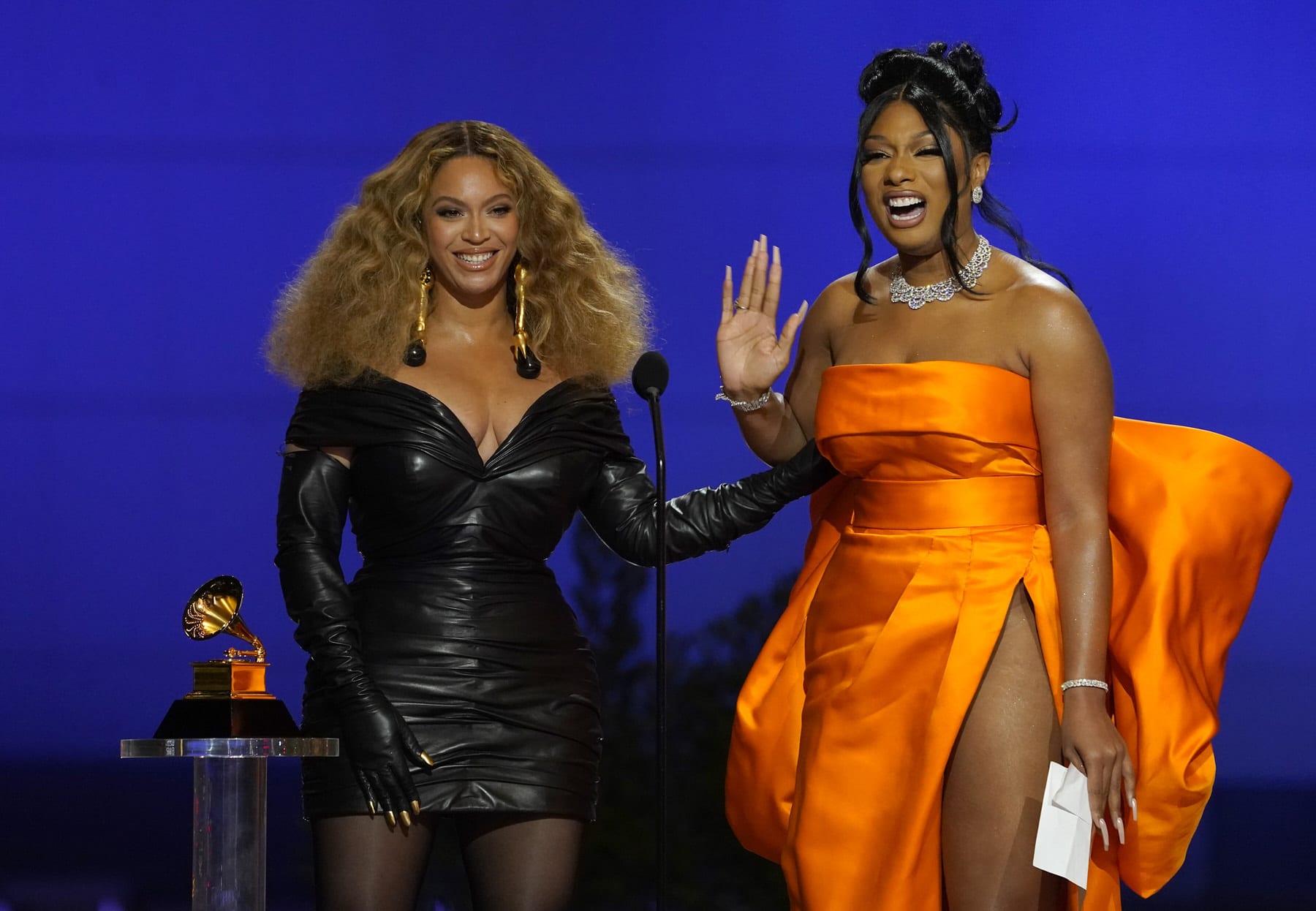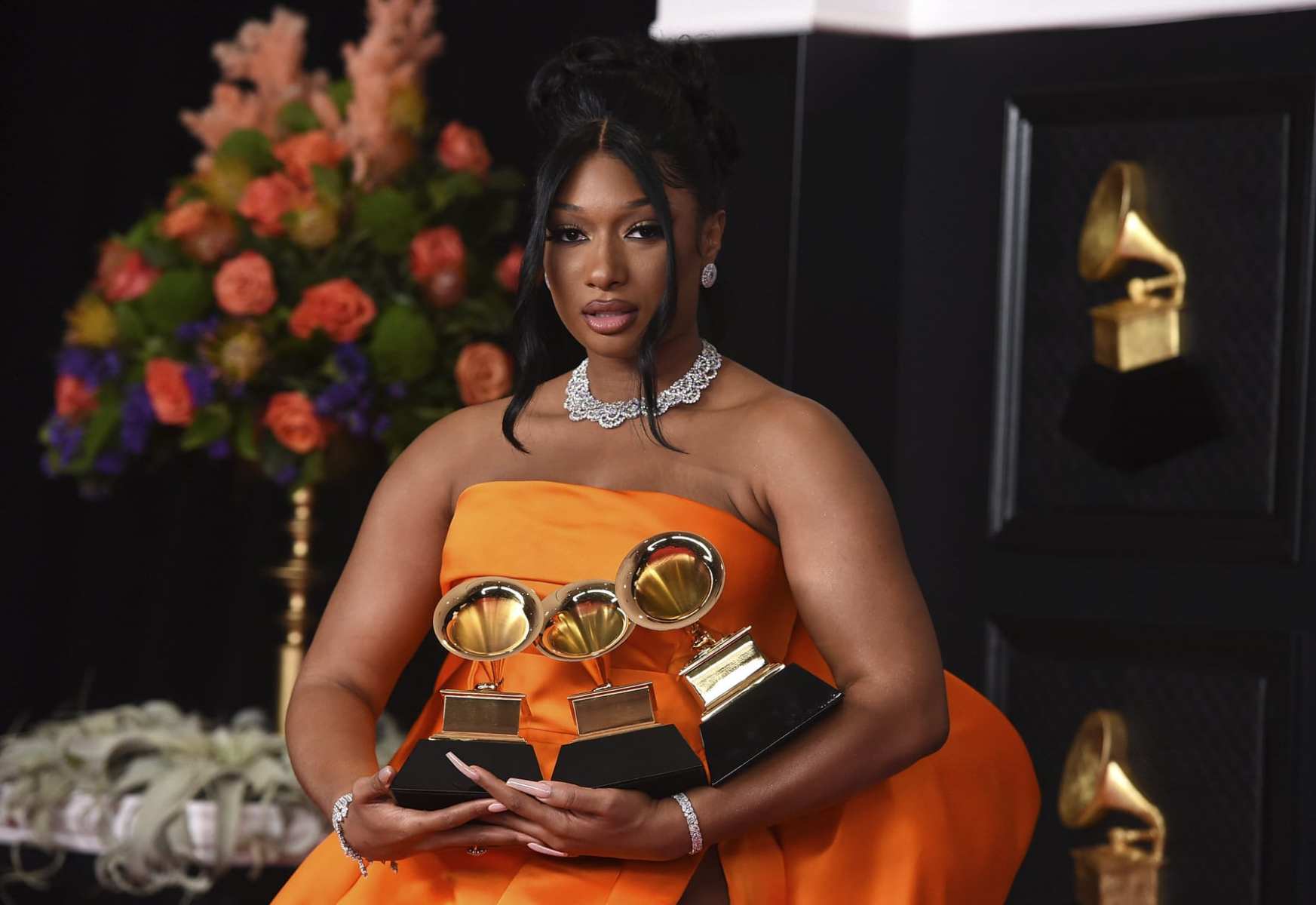Since Megan Thee Stallion and Cardi B’s “WAP” debuted last summer to critical acclaim, conservative politicians and far-right media figures have used it to lambast feminism and rap, claiming the explicit nature of the song — with its sex-positive lyrics and a decadent video to match — was a threat to children, especially young girls.
Last weekend at the 63rd Grammy Awards, Megan and Cardi took to the stage to perform the song live for the first time. The panic reignited. The Federal Communication Commission received approximately 80 complaints about the “WAP” performance from viewers, reports say. Megan and Cardi did their own dance numbers before joining together on one stage, where they locked legs for a few counts.
Aria S. Halliday, an assistant professor of gender studies at the University of Kentucky who writes about the political significance of feminism in hip-hop, expected the fallout. What Megan and Cardi provide in their artistry, Halliday says, is a sense of agency that women in hip-hop have exuded for decades amid intercommunal scrutiny and political debate. But Halliday argues that beyond hip-hop, women like Megan and Cardi provide a “counterpoint” to women who are touted as more obvious role models, like Michelle Obama and Vice President Kamala Harris.
“I think it’s really important that we talk about the ways that we hold up certain figures as the ones to model ourselves off of,” Halliday said. “But they can’t exist without these other so-called ‘negative representations.’ So you can’t have Michelle Obama without Cardi in a lot of ways.”
In conversation with The 19th, Halliday discusses double standards, the power of Black women demonstrating agency over their bodies and making room for ratchetness.
This interview has been edited for length and clarity.
The 19th: Has there been a similar moment to now, when a song has just totally become a conservative talking point or a cultural moment when a song transcended into politics in this way?
Aria S. Halliday: I would say that hip-hop has always had that positionality, particularly because it is a voice in many ways for a subculture of American culture. Black people created this particular expressive genre to talk about their experiences. The history of hip-hop is a perfect example of why it might be picked up in politics the way it is right now. Hip-hop is always [the conservative] shorthand for what ails the Black community.
“WAP” is just the most recent example of a way that conservatives — and I should even be direct and say some Black conservatives, too — use hip-hop as a way to discount the experiences of certain Black people, and in this case … Black women.
In this case, we have Megan, who’s from Houston and has been hustling for years, and Cardi, who is very clear about her roots as a stripper. But “WAP” is not totally different from a lot of hip-hop songs in which there’s a sense of owning your sexuality and having agency. When we have two Black women performing it, what makes it different?
Two Black women put together two things that Moya Bailey calls misogynoir. The hate and discrimination that women feel on the axis of sex and that Black people feel on the axis of race — Black women sit at this spot in the middle of that.
I think that Black women — especially the Black women who are loud, who are unapologetically sexy, who are unapologetically in your face, braggadocious — force people to face some things about who they are and who they believe themselves to be that they don’t like.
Houston is known as a Black city, it always has been, and Megan is very Southern, very Pimp C, sexy culture — I’ll put it like that. Whereas, Cardi, as you said, she comes from this background of selling the fantasy of sex. These women come together in a song where they’re talking about making decisions about what their sexual partners should be doing, what their bodies should be doing. The visuals are sexy — they’re like, fantastically sexy, right? [In the music video] there’s tigers, and there’s snakes and it’s all of this stuff that’s supposed to be forbidden. I don’t think we can miss that. [In the performance], they’re also kind of gyrating on each other. So this idea of lesbian sex is a huge point of concern for conservatives.
It’s interesting that people continue to have an issue with Black women talking about their bodies. They put people like Lil’ Kim against Missy Elliott and say Missy Elliott was a better rapper because she was covered up. If you listen to anything Missy Elliott ever said, like “One Minute Man,” for example, she was very clear about her sexual decisions and choices.
I think it is a kind of misremembering and misunderstanding of what hip-hop represents, but also what Black women in the hip-hop space are allowed to do. We’re supposed to be the dancers, ready for the “Tip Drill” kind of activity. But we’re not supposed to be the ones who are navigating and telling people what we want.
I’m thinking about rappers you just mentioned like Lil’ Kim, who is top of mind as a woman who is very clear about her desires and what she wants from her partner, rapping about it and being sexy in public. What are the politics of that that get construed both negatively and positively?
People like Lil’ Kim, and I write about Nicki Minaj in my own work, provide an opportunity to kind of open the windows, or for lack of a better pun, spread the legs a little bit of what Black women are allowed to do in a public space. Regardless of how far we believe that we’ve come, we still have the politics of respectability, we still have the kind of resonances of the Black church and what it means to be covered up, what makes a woman good, what you talk about in public, what you do in public.
I hold up Nicki as someone who was doing it by herself for a long time, and I think opened the door for a lot of what we’re seeing now. Without those kinds of counterpoints you can’t have somebody like Kamala Harris. You can’t have Michelle Obama without Cardi in a lot of ways.
Racquel Gates says this in her book called “Double Negatives.” These “negative” representations, if you want to call them that, allow us to have these conversations in a public sense. So if we never had “WAP,” for example, would we be talking about what it means for two Black women to be on the front stage simulating sexual activity? No. It opens up a space to talk about Black woman and desire or lesbian desire or lesbian sex or sex in general, and who determines what can be had in a sexual space.
I would say that having those types of examples give us the motivation or inspiration to have those conversations with ourselves, with our partners, with our friends, in our churches, in our synagogues, in schools. I can imagine that young women who are listening to what Cardi B is saying about her body and the choices that she’s making providing an opportunity for them to have those kinds of conversations with their friends or with their sexual partners.
I want to latch onto something you said earlier about having women like Kamala Harris or Michelle Obama seen as role models for Black girls in particular. Can you say more about the cultural relationship between those women and women like Megan and Cardi, and how respectability politics causes us to see one group as leaders and the others as what not to do with your womanhood?
We get taught very early, especially if you grew up in the South like I did, how to wear your stockings, how to wear your hair, and what should be covered and when to be covered. And I think that we know what that looks like. But, millennial Black women have to kind of figure out, really out loud, what it means to have some kind of complicated relationships with our bodies but also with sex. We’re taught how to cover up, we’re not really taught how to express ourselves beyond being covered.
Michelle Obama and Kamala Harris and others provide the example of what it looks like to be “successful” Black women. It’s not an accident that their hair is straight, it’s not an accident that their dress basically in suits most of the time, it’s not an accident that they are presented in certain kinds of ways.
Culture always allows for there to be a counterpoint or for there to be a “negative.” So if you have a positive, you have to have a negative, that’s the way science works, right?
I think that it provides a cultural sense of the complexity that we exist in. You don’t necessarily see Michelle Obama out here like Cardi, but people were surprised when Michelle Obama was rapping — she knows the songs.
And on the flip side, when Cardi interviewed Bernie Sanders [and Joe Biden], or when she talks politics on her Instagram, people are shocked.
Exactly.
A rap song called “Throat Baby (Go Baby)” came out last year. It’s definitely one of the more explicit mainstream songs I’ve heard in a long time. But the rapper, BRS Kash, who’s fairly unknown, adapted his lyrics to “Vote Baby” for a get-out-the-vote rally for the Georgia Senate races. I couldn’t imagine that ever happening with “WAP.”
You’re on the pulse of it, that it’s super appropriate for men’s sexuality, even conversations about men’s desire, penises in public discourse. It’s just out in the air.
Men are allowed to make references to their reproductive organs or their reproductive desires, and it’s considered to be common knowledge and/or normal. Which is why somebody like this dude who wrote “Throat Baby,” could have the opportunity on a very public stage to revamp a song. Whereas Cardi and Meg — especially Cardi, who had already been interviewing people in politics — are not given that same opportunity, and in fact are even ridiculed for having political conversations rather than making music.

I wanted to end by talking about another moment from the Grammys, when Megan not only realized she had won for the “Savage (Remix),” but that Beyoncé was there to accept the award with her. In Megan’s acceptance speech she honored the women who raised her, including her late mother, but she also thanked Beyoncé. She said her motto has been “What would Beyoncé do? But make it ratchet.” Can you talk about what a moment like this between two Black women signals to the music industry, but also to fans?
I think it means a lot when the so-called ratchet of us are recognized. This goes back to exactly what I’m saying: For the positive, there has to be a counterpoint. So for the respectable one, there has to be a ratchet one — and I don’t even like that dichotomy, necessarily. But you understand what I mean: Megan, her statement is not only about Beyoncé and her coming from Houston, but also the work Beyoncé has done in pushing the culture to these conversations about respectability, around sexuality, about women’s desire. If you go from early Beyoncé to “Lemonade,” you’re getting a lot of conversation about what women want and what women desire over time, that I think allows someone like Megan to see where she can make space for herself. Beyoncé, but ratchet; Beyoncé, but me.
Having both points allows us that middle ground and allows us that space to be like, ‘Yeah, I want to be like Michelle Obama, but ratchet, or Beyoncé, but ratchet, or, Cardi and less ratchet.’ You can have these multifaceted ways that we identify or express ourselves. And I think that Megan’s statement just speaks to what I feel is an awakening for us — that Black women can live their life the way they want and be out loud about it. It doesn’t need to be in the shadows, and it doesn’t need to be shameful, and it doesn’t need to fit a particular box, because we see that there’s space for everybody.






